Unit 2 It's Show Time!Lesson 12 A Blog about the Silk Road.课件
文档属性
| 名称 | Unit 2 It's Show Time!Lesson 12 A Blog about the Silk Road.课件 | 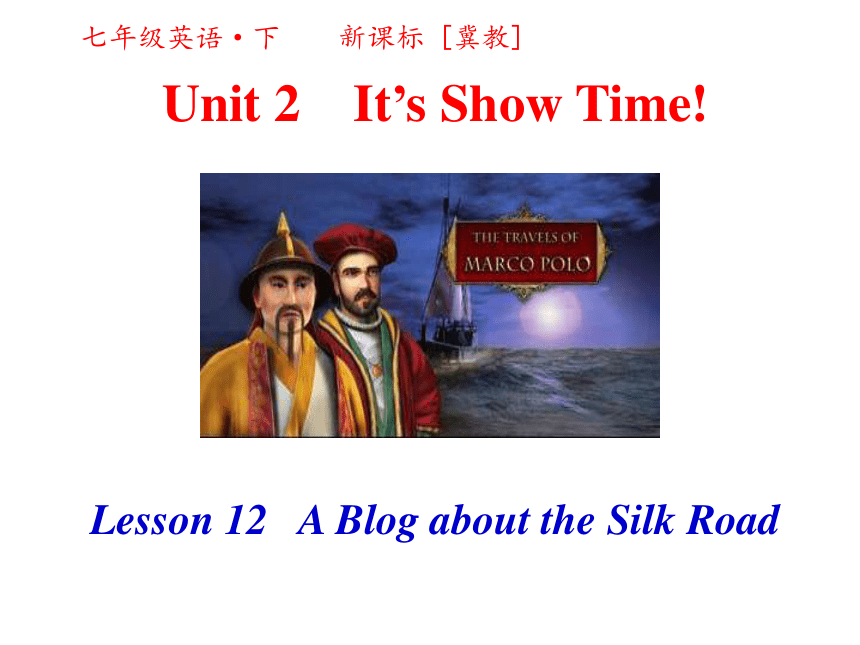 | |
| 格式 | zip | ||
| 文件大小 | 234.7KB | ||
| 资源类型 | 教案 | ||
| 版本资源 | 冀教版 | ||
| 科目 | 英语 | ||
| 更新时间 | 2018-04-05 13:57:35 | ||
图片预览


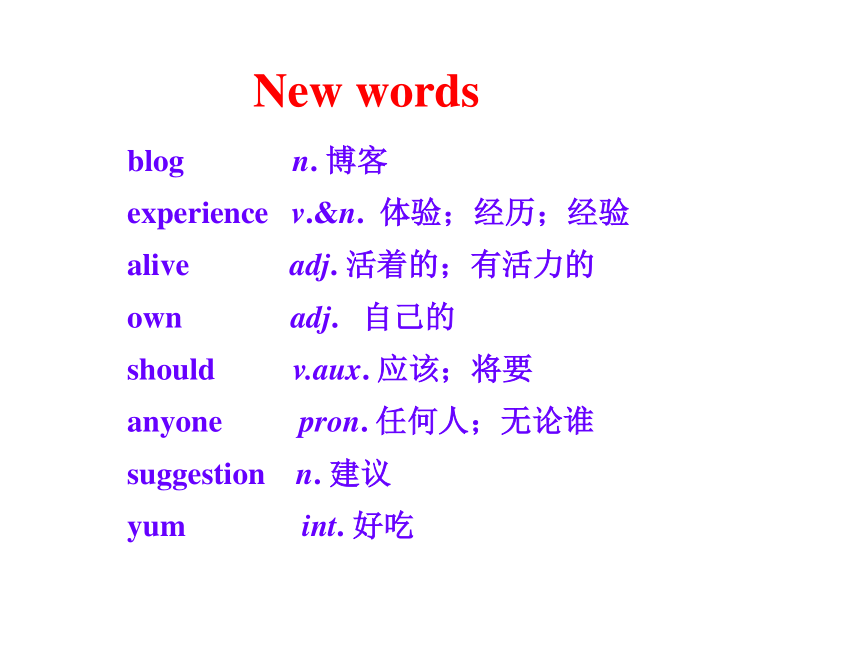
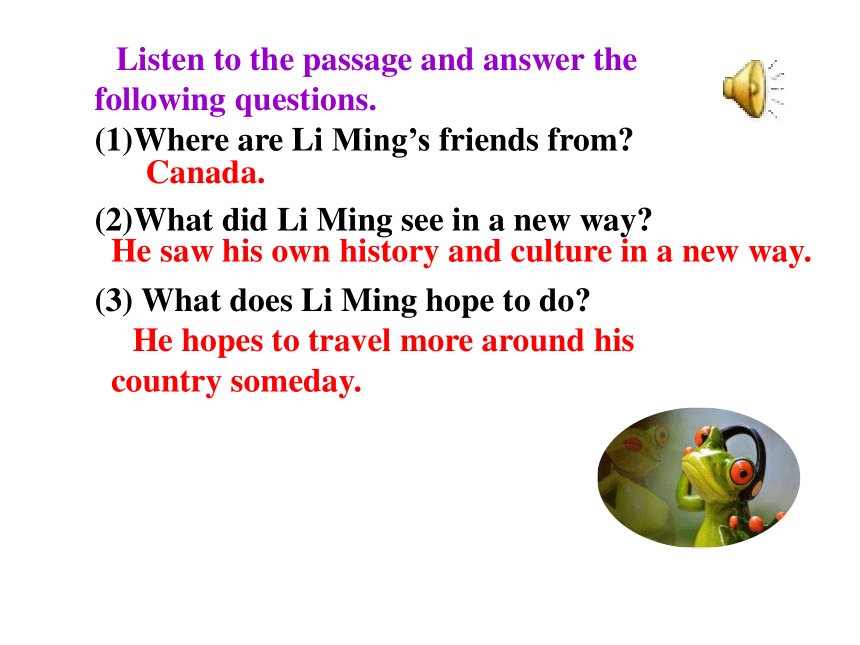
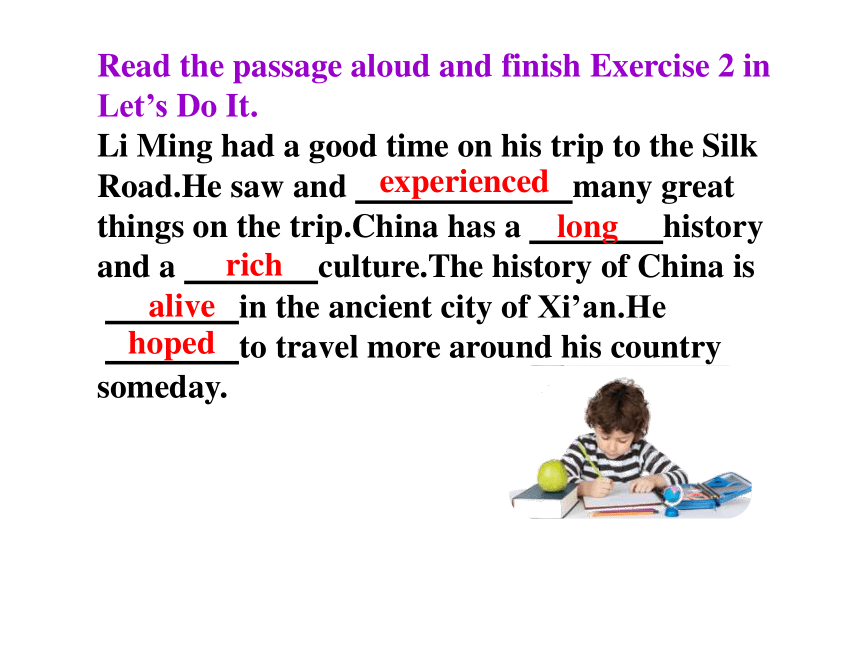
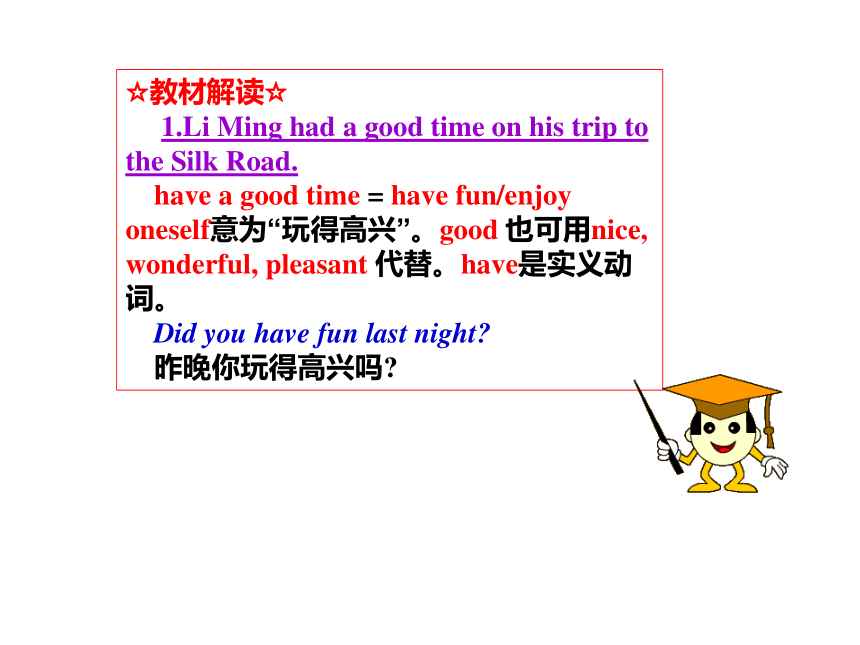

文档简介
课件17张PPT。Lesson 12 A Blog about the Silk RoadUnit 2 It’s Show Time!七年级英语·下 新课标 [冀教]Free talkDo you write blogs?
What’s it about?
Do you know the blog?blog n. 博客
experience v.&n. 体验;经历;经验
alive adj. 活着的;有活力的
own adj. 自己的
should v.aux. 应该;将要
anyone pron. 任何人;无论谁
suggestion n. 建议
yum int. 好吃New wordsListen to the passage and answer the following questions.
(1)Where are Li Ming’s friends from?
(2)What did Li Ming see in a new way?
(3) What does Li Ming hope to do?
Canada.He saw his own history and culture in a new way.
He hopes to travel more around his country someday.Read the passage aloud and finish Exercise 2 in Let’s Do It.
Li Ming had a good time on his trip to the Silk Road.He saw and many great things on the trip.China has a history and a culture.The history of China is
in the ancient city of Xi’an.He
to travel more around his country someday.
experiencedlong richalivehoped☆教材解读☆
1.Li Ming had a good time on his trip to the Silk Road.
have a good time = have fun/enjoy oneself意为“玩得高兴”。good 也可用nice, wonderful, pleasant 代替。have是实义动词。
Did you have fun last night?
昨晚你玩得高兴吗?2.I just got back from a great trip to the Silk Road.
get back from意为“从……回来”。get back to…= return to…意为“回到……”。get back home 意为“回到家”。
He will get back to Beijing this summer.今年夏天他将回到北京。3.I saw and experienced a lot on the trip.
◆experience用作动词,表示“体验,经历”。
He experienced a lot when he was young.
当他小的时候,他经历了很多。
【拓展】 (1)experience用作名词,表示“经验,体验”,是不可数名词。
He has much experience in the work.
他做这个工作很有经验。
(2)experience表示“经历”,通常是可数名词。
He had many interesting experiences while travelling in Africa.他在非洲旅行时,有很多有趣的经历。
◆句中的a lot用在动词saw 和 experienced 后作状语,意为“ 很多”。
We learned a lot on the farm.What about you?我们在农场上学到很多。你呢?4.The history of China is so alive in these places.
alive用作形容词,意为“活跃的;生动的”,为表语形容词,常用来指人,有时也可指物,作表语时与living 互换,作定语时,为后置定语。
He is very alive.他非常活跃。5.I saw my own history and culture in a new way.
◆own在句中用作形容词,意为“自己的”。
You should see it with your own eyes.
你应该用你自己的眼睛看。
【拓展】 (1)own为代词时,意为“自己的东西,属于自己的东西”,其后不接名词。无论是作形容词还是代词,其前都必须有名词所有格,或形容词性物主代词。
This car is my own.这辆汽车是我自己的。
(2)own为动词时,意为“所有,拥有”,等于have。
I want to own a big house.
我想拥有一个大房子。
◆in a new way意为“以一种新的方式”。
I can think about it in a new way.
我可以以一种新的方式来思考它。6.Where should I go next?
should应该,将要,后跟动词原形,否定结构是“shouldn’t”,即“不应该”。
What should I do?我应该做什么?
You shouldn’t eat in the classroom.
你不应该在教室里吃东西。7.Does anyone have any suggestions?
◆【辨析】 anyone,any one
(1)anyone=anybody,表示任何人,其后不可接of短语,用作主语时,谓语动词用单数。
Is anyone waiting for you?有人在等你吗?
(2)any one任何一个(人或物),用来表示只限一个,通常与of 短语连用。
You can have any one of the cars.
你可以要车里面的任意一辆。
◆suggestion 用作名词,意为“建议”,属于可数名词。
Could you give me some suggestions on how to learn English?你能给我一些如何学英语的建议吗?Wang Mei is searching for more information about the Silk Road. Work in groups. Help her answer the questions below.31. When did people begin to travel along the Silk Road?
2. What other cities or districts does the Silk Road go through?
3. How did it get the name the “Silk Road”?………Write an e-mail to a friend about a trip you went on. Show him or her some pictures from your trip.4Task tips:
Where/ When did you do? Who did you go with? What did you see and experience? Did you eat any traditional or special foods?
________________________________________________________________________________________________________________________________________________________________Fill in the blanks.
1.在旅途中我看到了很多,也经历了很多。
I saw and on the trip.
2.在这些地方中国的历史如此生动。
The history of China is in these places.
3.我用一种新的方法看到了我自己的历史和文化。
I my own history and culture
.
4.接下来我该去哪?
Where I next?
5.有没有人给些建议呢?
Does have any ?
experienced a lotso alive saw
in a new wayshould goanyone suggestionsHomework
1.Learn the new words and expressions by heart.
2.Read the blog after class.
3.Go over what you’ve learnt in this unit.
What’s it about?
Do you know the blog?blog n. 博客
experience v.&n. 体验;经历;经验
alive adj. 活着的;有活力的
own adj. 自己的
should v.aux. 应该;将要
anyone pron. 任何人;无论谁
suggestion n. 建议
yum int. 好吃New wordsListen to the passage and answer the following questions.
(1)Where are Li Ming’s friends from?
(2)What did Li Ming see in a new way?
(3) What does Li Ming hope to do?
Canada.He saw his own history and culture in a new way.
He hopes to travel more around his country someday.Read the passage aloud and finish Exercise 2 in Let’s Do It.
Li Ming had a good time on his trip to the Silk Road.He saw and many great things on the trip.China has a history and a culture.The history of China is
in the ancient city of Xi’an.He
to travel more around his country someday.
experiencedlong richalivehoped☆教材解读☆
1.Li Ming had a good time on his trip to the Silk Road.
have a good time = have fun/enjoy oneself意为“玩得高兴”。good 也可用nice, wonderful, pleasant 代替。have是实义动词。
Did you have fun last night?
昨晚你玩得高兴吗?2.I just got back from a great trip to the Silk Road.
get back from意为“从……回来”。get back to…= return to…意为“回到……”。get back home 意为“回到家”。
He will get back to Beijing this summer.今年夏天他将回到北京。3.I saw and experienced a lot on the trip.
◆experience用作动词,表示“体验,经历”。
He experienced a lot when he was young.
当他小的时候,他经历了很多。
【拓展】 (1)experience用作名词,表示“经验,体验”,是不可数名词。
He has much experience in the work.
他做这个工作很有经验。
(2)experience表示“经历”,通常是可数名词。
He had many interesting experiences while travelling in Africa.他在非洲旅行时,有很多有趣的经历。
◆句中的a lot用在动词saw 和 experienced 后作状语,意为“ 很多”。
We learned a lot on the farm.What about you?我们在农场上学到很多。你呢?4.The history of China is so alive in these places.
alive用作形容词,意为“活跃的;生动的”,为表语形容词,常用来指人,有时也可指物,作表语时与living 互换,作定语时,为后置定语。
He is very alive.他非常活跃。5.I saw my own history and culture in a new way.
◆own在句中用作形容词,意为“自己的”。
You should see it with your own eyes.
你应该用你自己的眼睛看。
【拓展】 (1)own为代词时,意为“自己的东西,属于自己的东西”,其后不接名词。无论是作形容词还是代词,其前都必须有名词所有格,或形容词性物主代词。
This car is my own.这辆汽车是我自己的。
(2)own为动词时,意为“所有,拥有”,等于have。
I want to own a big house.
我想拥有一个大房子。
◆in a new way意为“以一种新的方式”。
I can think about it in a new way.
我可以以一种新的方式来思考它。6.Where should I go next?
should应该,将要,后跟动词原形,否定结构是“shouldn’t”,即“不应该”。
What should I do?我应该做什么?
You shouldn’t eat in the classroom.
你不应该在教室里吃东西。7.Does anyone have any suggestions?
◆【辨析】 anyone,any one
(1)anyone=anybody,表示任何人,其后不可接of短语,用作主语时,谓语动词用单数。
Is anyone waiting for you?有人在等你吗?
(2)any one任何一个(人或物),用来表示只限一个,通常与of 短语连用。
You can have any one of the cars.
你可以要车里面的任意一辆。
◆suggestion 用作名词,意为“建议”,属于可数名词。
Could you give me some suggestions on how to learn English?你能给我一些如何学英语的建议吗?Wang Mei is searching for more information about the Silk Road. Work in groups. Help her answer the questions below.31. When did people begin to travel along the Silk Road?
2. What other cities or districts does the Silk Road go through?
3. How did it get the name the “Silk Road”?………Write an e-mail to a friend about a trip you went on. Show him or her some pictures from your trip.4Task tips:
Where/ When did you do? Who did you go with? What did you see and experience? Did you eat any traditional or special foods?
________________________________________________________________________________________________________________________________________________________________Fill in the blanks.
1.在旅途中我看到了很多,也经历了很多。
I saw and on the trip.
2.在这些地方中国的历史如此生动。
The history of China is in these places.
3.我用一种新的方法看到了我自己的历史和文化。
I my own history and culture
.
4.接下来我该去哪?
Where I next?
5.有没有人给些建议呢?
Does have any ?
experienced a lotso alive saw
in a new wayshould goanyone suggestionsHomework
1.Learn the new words and expressions by heart.
2.Read the blog after class.
3.Go over what you’ve learnt in this unit.
同课章节目录
- Unit 1 A Trip to the Silk Road
- Lesson 1 A Trip to China
- Lesson 2 Meet You in Beijing
- Lesson 3 A Visit to Xi'an
- Lesson 4 A Visit to Lanzhou
- Lesson 5 Another Stop along the Silk Road
- Lesson 6 Jenny's Diary
- Unit 2 It's Show Time!
- Lesson 7 What's Your Project about?
- Lesson 8 Marco Polo and the Silk Road
- Lesson 9 Danny's School Project
- Lesson 10 Music and Dance
- Lesson 11 Food in China
- Lesson 12 A Blog about the Silk Road
- Unit 3 School Life
- Lesson 13 How Is School Going?
- Lesson 14 Jenny's School Life
- Lesson 15 Making a Difference
- Lesson 16 We Are with You!
- Lesson 17 School Science Fai
- Lesson 18 Teaching in China
- Unit 4 After-School Activities
- Lesson 19 A Dinner Date
- Lesson 20 Join Our Club!
- Lesson 21 What Is Your Club Type?
- Lesson 22 Big Plans for the Weekend
- Lesson 23 A Weekend with Grandma
- Lesson 24 How was Your Weekend?
- Unit 5 I Love Learning English!
- Lesson 25 A Phone Friend
- Lesson 26 Online Phone Calls
- Lesson 27 Amazing English
- Lesson 28 How Do I Learn English?
- Lesson 29 A Door to the World
- Lesson 30 Writing an E-mail in English
- Unit 6 Seasons
- Lesson 31 What Strange Weather!
- Lesson 32 I Can't Wait for Winter!
- Lesson 33 Kim's Favourite Season
- Lesson 34 Steven's Report
- Lesson 35 Surfing in Sydney
- Lesson 36 Spring in China
- Unit 7 Sports and Good Health
- Lesson 37 You Are What You Eat!
- Lesson 38 Stay Healthy!
- Lesson 39 Danny's Report
- Lesson 40 Move Your Body
- Lesson 41 Were People Healthy Then?
- Lesson 42 Know Yourself
- Unit 8 Summer Holiday Is Coming!
- Lesson 43 Have a Good Summer!
- Lesson 44 Volunteering in Summe
- Lesson 45 Baseball Season
- Lesson 46 Get Ready for Summer Holiday!
- Lesson 47 Summer Plans
- Lesson 48 Li Ming's Summer Holiday
